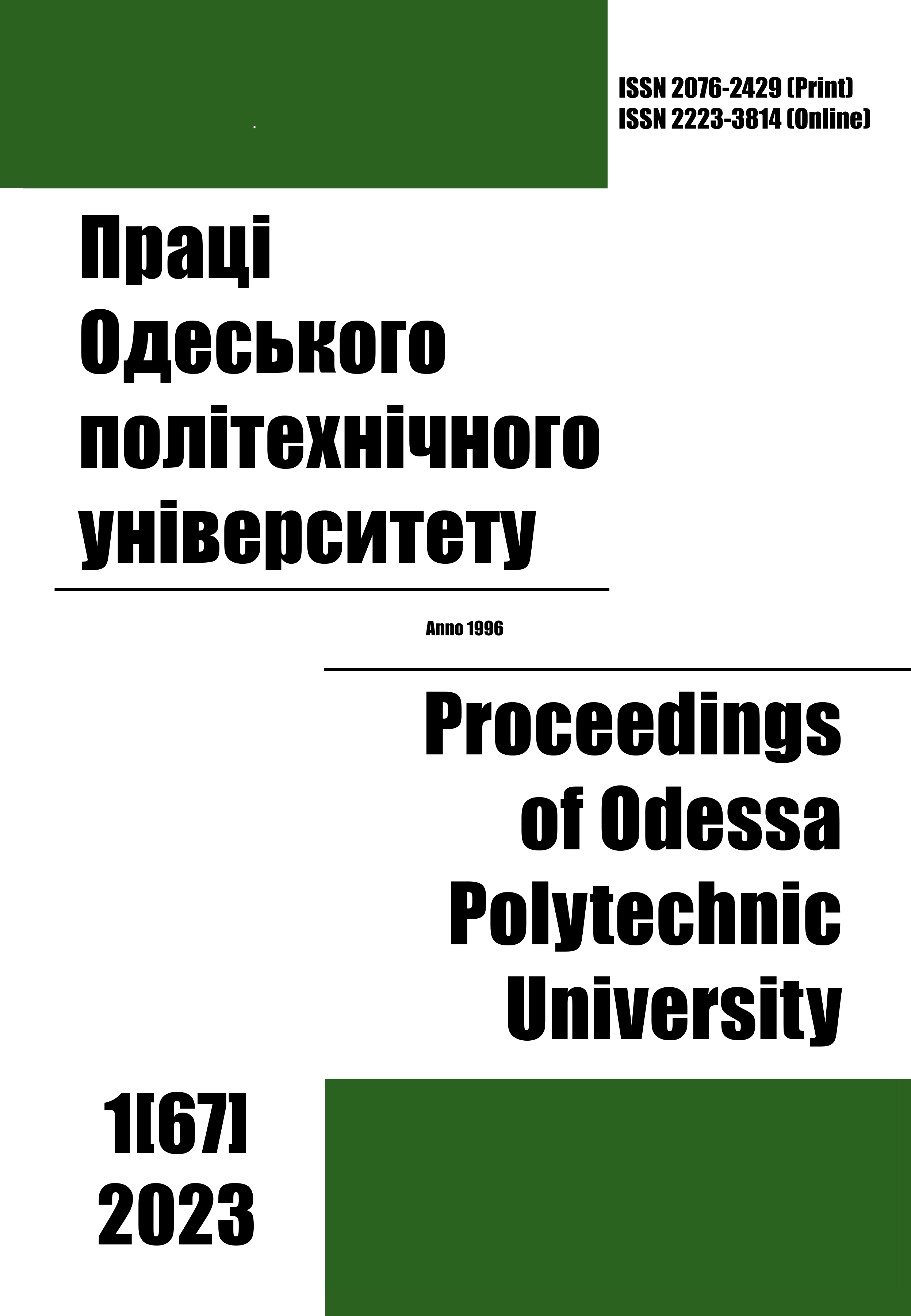Особливості формування структури фотомодуля PV-MD при виробництві електричної енергії й дистиляту
DOI:
https://doi.org/10.15276/opu.1.67.2023.03Ключові слова:
гібридний сонячний колектор, метод PV-MD, температурний режим, виробництво дистилятуАнотація
Умови роботи фотомодуля значною мірою визначаються термічним режимом, який впливає на ефективність виробництва електроенергії. Застосування у фотомодулі системи примусового охолодження з реалізацією процесу дистиляції солоних вод дозволяє управляти термічним режимом і одержувати додатковий продукт у вигляді пресної води. Вибір способу керування процесом охолодження й режиму його реалізації дає можливість досягнення раціонального сполучення електричної й технологічної продуктивності фотомодуля. У даній роботі проведені аналітичні дослідження формування температурного поля абсорбера гібридного сонячного колектора (PV-MD) при охолодженні за рахунок випарювання теплоносія і рекуперації теплоти утворенного пару. Метод дослідження дозволяє проаналізувати характеристики PV-MD-колектора температуру нагрівання абсорбера й охолоджуючої рідини, а також продуктивність системи по дистиляті залежно від структури модуля й умов його роботи. Ціль роботи - розробка методу розрахунку теплотехнічних експлуатаційних характеристик роботи гібридного сонячного колектора в умовах каскадного способу тепломасообміну сольового розчину й дистиляту і виявлення раціональної архітектури пристрою. Використано комплексну математичну модель локального аналізу процесів теплоомасообміну гібридного сонячного колектора для реальних умов сонячної й кліматичної ситуації. Аналіз тепломасообміну у варіантних умовах показав, що ступінь рівномірності температурного поля абсорбера, від якої залежить ефективність виробництва електрики, при застосуванні методу PV-MD така, як для методу PVT. Каскадна рекуперація теплової енергії при методі PV-MD для колекторів типових розмірів за ефективностю обмежується двома ступінями. Отримано узагальнюючі залежності для визначення технологічної продуктивності двоступінчатого PV-MD-колектора по дистиляті й температури абсорбера при зміні зовнішніх умов роботи колектора, які можуть бути використані для оцінки ефективності перетворення сонячної енергії в технологічний продукт.
Завантаження
Посилання
Rao V.T., Sekhar Y.R., Pandey A.K, Said Z. Thermal analysis of hybrid photovoltaic-thermal water collector modified with latent heat thermal energy storage and two side serpentine absorber design. Journal of Energy Storage. 2022. V. 56, Part A, 1. DOI: https://doi.org/10.1016/j.est.2022.105968.
Performance and economic analysis of hybrid solar collector-powered integrated absorption/revers osmosis multigeneration system / Hassan A.A., Elwardany A.E., Ookawara S., Sekiguchi H., Hassan H. International Journal of Energy Research. 2022. V. 46, (14). P. 19414–19437. DOI: https://doi.org/10.1002/er.8512.
Pater S. Long-Term Performance Analysis Using TRNSYS Software are of Hybrid Systems with PVT. Energies. 2021. 14, (21). 6921. DOI: https://doi.org/10.3390/en14216921.
A Review of Photovoltaic Thermal (PVT) Technology for Residential Applications: Performance Indicators / Bandaru S.H., Becerra V., Khanna S., Radulovic J., Hutchinson D., Khusainov R. Progress and Opportunities. Energies. 2021. 14. 3953. 48 р. DOI: https://doi.org/10.3390/en14133853.
Simultaneous production of frech water and electricity via multistage solar photovoltaic membrane distillation / Wang W.,Shi Y, Zhang C., Hong S., Le Shi, Chang J., Li R., Jin Y., Ong C.,.Zhuo S, Wang P. Nature communications. 2019. 10:3012. 9 p. DOI: https://doi.org/10.1038/s41467-019-10817-6.
Solar Seawater Distillation by Flexible and Fully Passive Multistage Memdrane Distillation / Wang W., Shi Y., Zhang C., Li R., Wu M., Zhuo S., Aleid S., Wang P. Nano Letters. 2021. 21. Р. 5068–5074. DOI: https://doi.org/10.1021/acs.nanolett.1cD0910.
Wysochin V.V., Nikulshin V.R., Denysova A.E. Thermal Operating Conditions of the Hybrid Photomodule with any Expense of the Heat Carrier. Proceeding of Odessa Politechnic University. 2022. Issue 1(65). P. 56–61. DOI: 10.15276/opu.1.65. 2022.06.





